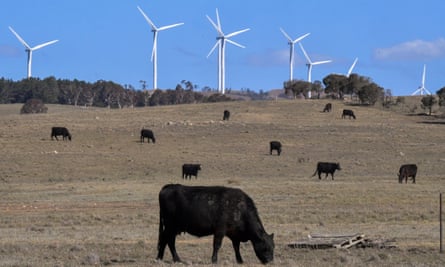Extract from The Guardian
Australia must embrace emerging technologies and coherent energy policy is essential, Electrical Trades Union chief says

Last modified on Mon 16 Nov 2020 18.20 AEDT
The union representing electrical workers has urged the federal opposition to be bold and set a strong emissions reduction target for 2030, warning Labor against any “reckless” move to adopt the Morrison government’s climate policies.
The Electrical Trades Union, which says its members include more than 60,000 energy industry workers across Australia, is appealing to the Labor shadow cabinet not to sign up to “Coalition slogans” after Joel Fitzgibbon quit the frontbench amid divisions over climate and energy policy.
In an interview with Guardian Australia, the ETU national secretary, Allen Hicks, said the nation had a “massive opportunity” to get behind emerging technologies including battery storage and hydrogen and lay out a transition plan.
Workers didn’t need “false hope”, he said. “The problem is it’s this bullshit argument about whether coal is going to be there or not be there, whether gas will be there or not be there.”
Hicks confirmed Fitzgibbon’s resignation last week was the catalyst for his writing a letter to the federal Labor leader, Anthony Albanese, which he copied to the entire shadow ministry.
Friday’s letter stated: “With respect, the debate of if you are ‘for coal’ or ‘against coal’ and talking about the transition like it is some kind of conceptual future possibility is seen by our members as a self-indulgent diversion from the fact that they are losing their traditional stable and secure jobs at an ever-increasing pace right now.”
Hicks said on Monday the federal government’s “ad hoc” approach to climate and energy issues had created a policy vacuum that needed to be filled to give workers certainty and confidence.
He said traditional coalmining areas were increasingly reliant on labour hire and casual workforces. Political parties would not be not doing workers in traditional industries any favours by “giving them false hope”.
“We know, given that renewables are so much cheaper, that the projected life of some of the coal-fired power stations is going to be at risk, so this is urgent,” Hicks said, echoing recent warnings from the chair of Australia’s Energy Security Board. “It’s actually going to start affecting the commercial life of some of the existing power stations.”
Hicks argued the Labor party needed to “stop the distraction of arguing the merits or otherwise of fossil fuels and get on with the job of settling a coherent energy policy to take to the next election” while warning that “the politics of adopting Coalition slogans in part or in whole is reckless”.
The union boss said it would be wrong for the opposition to adopt a small-target strategy leading into the election due late next year or early 2022.
“What I’m saying is the Labor party know, and they’ve got the facts in front of them, about renewables and the opportunities they can create – they have to be bold,” he said.
Hicks said the opposition needed to embrace the future. He backed Albanese’s budget reply “rewiring the nation” policy to upgrade the transmission network, saying it was an example of a practical “jobs-rich” move to help resolve the nation’s energy woes.
Fitzgibbon has argued for months that Labor should simply adopt the government’s 2030 target of reducing emissions by 26% to 28% below 2005 levels – although the government intends to meet this target partly through Kyoto carryover credits.
Hicks said he did not think Labor signing up to the same medium-term target would be a good idea because the federal government had been “a policy vacuum in energy for years”. He said the opposition should seize the opportunity to sketch out an alternative message.
As the nation came out of the Covid crisis, people wanted training opportunities, clean energy and cheaper power, he said. “The rest of the world is getting on with it.”
Hicks’ intervention follows a briefing to Labor MPs late last month from the leadership of the Australian Workers’ Union and the construction and mining union.
Those unions told Labor MPs gas would be needed in the transition to renewable energy and urged them to defend blue-collar workers in traditional industries or face losing another election.
But in his letter, Hicks said the economic reality was that fossil fuel-fired power generation was in decline, renewables were a huge growth industry, and Australia’s export destinations such as Japan and South Korea were increasingly committing to net zero by 2050.
Government officials confirmed at an estimates committee hearing last month that Australia was still the only country to indicate it intended to use Kyoto carryover credits to help meet the 2030 target – something Labor has described as an “accounting trick”.
NSW Labor senator Tim Ayres said on Monday the “constant debate and focus” on Fitzgibbon’s views had been “a real distraction” for the opposition over the past week.
“What has begun to happen is that it’s become a freewheeling series of opinion pieces and media interviews and that has become a distraction in a week where there should have been a really strong focus on the Morrison government’s policy failures in terms of economic response to the coronavirus,” Ayres told radio station 2NZ Inverell.
Albanese is due to visit the Tomago aluminium smelter on Tuesday. While Fitzgibbon has pushed the case for coal in his formerly safe seat of Hunter others in the region – including mayors, unions and businesses – have begun planning for the long-term decline of the industry.
A new report by the Grattan Institute argues the gas industry will inevitably decline as an energy source for industry and homes due to both economic and environmental issues. The government disputes the analysis.
No comments:
Post a Comment